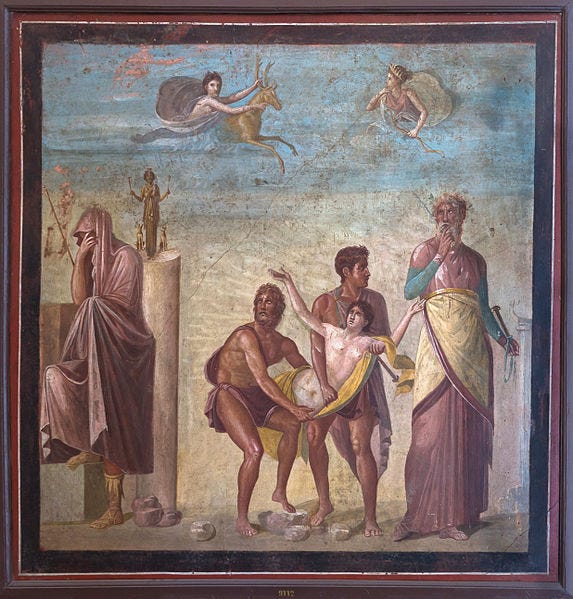Liberated in Love
Homily for Sunday, November 24, 2024: Solemnity of Christ the King
There’s an old story out of Greek Mythology – this isn’t one of the fun stories with heroes slaying monsters, this is a tragedy by the ancient playwright Euripides. It’s the story of Iphigenia at Aulis.

The Greek armies are assembling for the Trojan War, loading up their warships at the harbor at Aulis. They’re fired up and ready to go kick some Trojan butt. The only problem is, there is no wind.
Without wind for their sails, their ships are stranded. They can’t cross the sea to fight their war. All these troops are left sitting, waiting, growing restless. Their general Agamemnon goes to the local Oracle to ask, what must we do to release the winds?
He learns that Artemis, the goddess of this place, is unhappy with these gathered troops coming here, being rowdy and unruly, hunting and killing her sacred stag. The Oracle tells Agamemnon that if he is so intent on sailing off to war he must sacrifice to the goddess his eldest daughter, Iphigenia.
The play by Euripides goes on to detail the struggles Agamemnon must go through – with his wife and family, with his own conscience, with his legions of soldiers impatient to set sail. Those who know the ancient histories and mythologies of Homer’s epic works will realize that the Greeks do make it to Troy to wage their war on that city. Agamemnon ultimately does the unthinkable to make it happen.
I studied this play in high school, in an extracurricular class on Leadership. We discussed the question of whether Agamemnon was able to be a leader in this situation, or if he was ultimately a slave to the will of those he led.
We might ask the same question of Pontius Pilate.
Today we celebrate the Solemnity of Christ the King. This feast was established in 1925, between two world wars, at a time which saw a rise of totalitarian governments all struggling for domination. Pope Pius X gave us this feast as a reminder that, as worldly powers rise and fall, the authority of Jesus Christ our eternal King remains constant.
Our Gospel reading today shows us that stark contrast between the worldly power of Pilate, and the divine authority of Jesus.
It’s a short excerpt today of a longer story we all know well from Holy Week. Pilate protests that he can find no crime, no reason to execute this man. But like Agamemnon he puts aside his own conscientious objections to sacrifice an innocent victim to the demands of public opinion.
Jesus, by contrast, is always in control of the situation. John’s Gospel especially shows him throughout as the one who directs his own destiny rather than having it forced upon him.
When Pilate asks him, then you are a King? Jesus turns it around. You say I am a king. Your words, not mine. It’s a challenge to rethink our understanding of what it means to be a king.
Jesus comes to us as the Servant King. The King who, just a few chapters earlier, knelt to wash the feet of his subjects. The King who willingly lays down his own life and takes it up again. He is the King who loves us and frees us by his own blood, as our reading from Revelation says.
Jesus tells Pilate that my Kingdom is not of this world. This world is subject to fear and death. Those who rule in this world rule through fear and death. The problem is, as Pilate and Agamemnon both discover, fear can turn on you. Those who rule by fear are themselves ruled by it.
Jesus, on the other hand, rules by Love. It is in Love that the Servant King serves, and in Love he calls us, His subjects, to go and do likewise.
The leaders of the World play at strength by dominating the weak. Jesus calls us to a show of true strength, which uplifts the lowly and protects the widow, the orphan, the poor, and the oppressed.
This is God’s perfect Love, which casts out Fear. This is why our World, ruled by Fear, fears this perfect Love of God and will do all it can to make us fear it too.
Love makes us vulnerable. The Apostles’ love for Christ made them vulnerable to the same arrest and persecution Christ was suffering, causing them to flee in fear and abandon him to his fate.
Agamemnon’s love for his daughter made him vulnerable, causing him to suppress it out of fear, to do what no father would ever willingly do.
But it is in this vulnerability that Love finds its greatest strength. Fear separates us from one another, leaving us isolated and alone against the world. Love unites us, draws us together, making us one in Christ.
It is in this unity, as Church, as Body of Christ, united in service to the good of all the world, that the King of Love conquers the world of fear.

